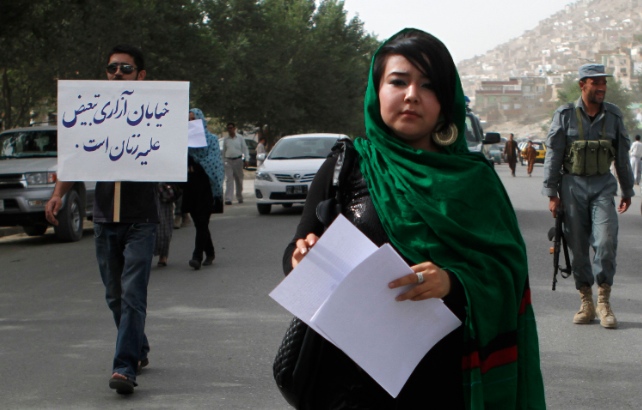
While oppression still dominates, Afghan women can now be the authors of a new narrative.
Stories of the honour killing and ongoing oppression of Afghan women are agonizing, but it is promising to see that the killers are being trailed and the news is reaching the world. The tragic case of the Shafia family is still underway in Canada, and, in November, in the Ghazni province of Afghanistan, a mother and daughter were stoned and shot dead 300 meters away from the governor’s office. They were charged with “immoral deviation and adultery” – another instance of women’s oppression in Afghanistan. And yet, perversely, for women living in Afghanistan, these, and many similar, stories show the strengthened voice that they have gained in civil society. The dominant culture still creates case after case of oppression against women, yet the Independent Human Rights Commission, which is headed by a woman, documents and publicizes these cases for the first time.
Voice is the first weapon of power, and Afghan women have not gained it easily. They have lived in silence for decades, and it has taken the support of thousands of people in Canada and other countries for Afghan women to be seen and heard within their own society. Since the fall of the Taliban, women have gained not only a presence in the country, but a voice, too. Some women activists argue that the presence of women in the government and parliament is only symbolic and does not empower women with the capacity to make their own decisions. While this might be true to some extent, the presence of women as a group has created a body and given voice to many intelligent and brave individuals. A woman governing a province breaks an old tradition of uniformly male governors, even if it is just one woman in one province for now.
As an empowered and highly educated Afghan-Canadian with feminist principles in the West, I found it agonizing to voice my own life experience in my memoir, On The Edge of Being: An Afghan Woman’s Journey. Narrating the stories of the multifaceted abuse that I came across myself, and that I heard of other women experiencing throughout Afghanistan, I questioned my optimistic image of Afghan women. As a result, the stories depict a dark picture of the lives of Afghan girls and women who were punished for their sexuality or their desire to love. But the accounts from back then are as true as our current news of honour killing is today. And although the present realities of honour killing, whether inside or outside Afghanistan, confirm the darker reality of Afghan women’s lives, they must also remind us that Afghan women are survivors.
Oppression of women has long been an inseparable reality of Afghan society, and women have lived through it, in spite of it, and, at times, against it. For the women of present-day Afghanistan, the reality of societal and cultural oppression may not have changed much, but they have gained a voice and that voice has a narrative. Many Afghan women politicians, activists and members of civil society echo the stories of oppression, and the media is now there to make the news public around the world. The wound may be deep and old, but the silence is being broken by a cry for help that is getting louder. When Malalai Kakar, the most high-profile female police officer in Afghanistan and the head of Kandahar’s department of crimes against women, was murdered by the Taliban in 2008, another brave Afghan woman stepped up to fill her position. Gulnnaz, a victim who was imprisoned for her own rape, is another representative of the bitter reality of Afghan society – yet the call for her release that made President Hamid Karzai free her is a taste of an improving reality presently taking shape in Afghanistan.
During the 2009 presidential election, I worked as a host for Rana FM radio, which was broadcasting for Kandahar and was funded by the Canadian military. I conducted an interview with a young schoolgirl in Kandahar who told me that her goal was to one day become the president of Afghanistan. She is just one example of a new narrative that is being created by Afghan women – one that, in spite of atrocity, has tasted the freedom to voice itself and to survive, paving the road for women to fight oppression.
Original Article
Source: the Mark
No comments:
Post a Comment